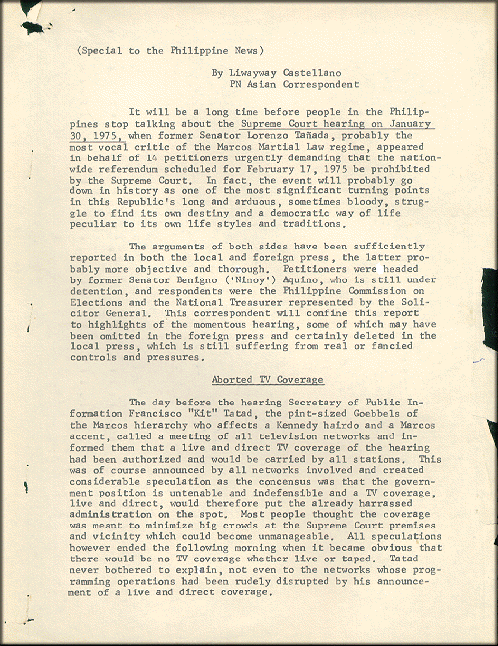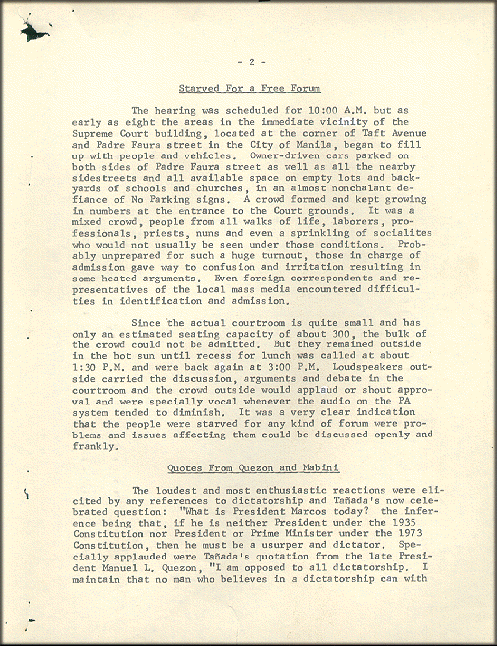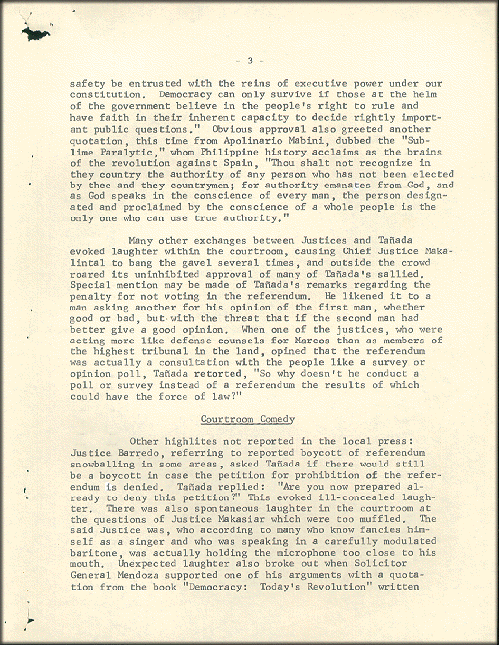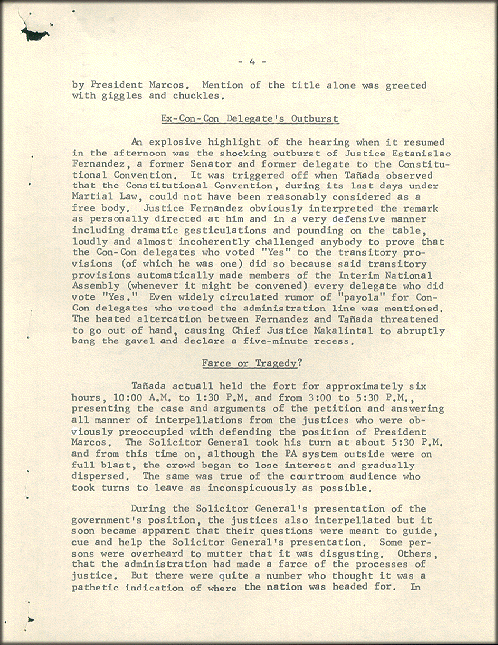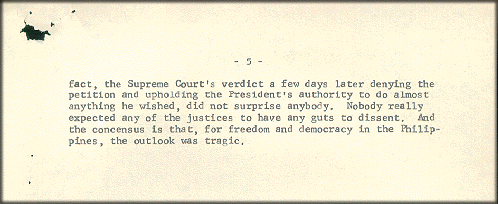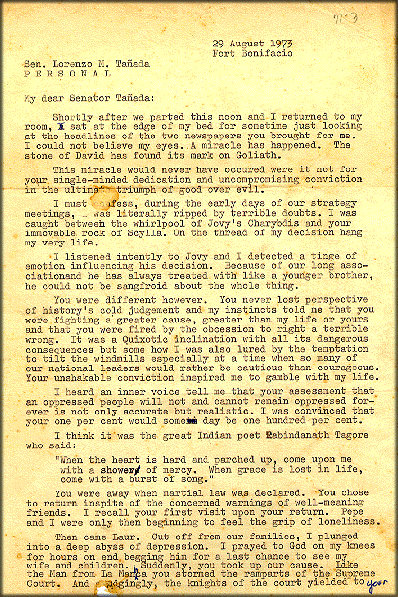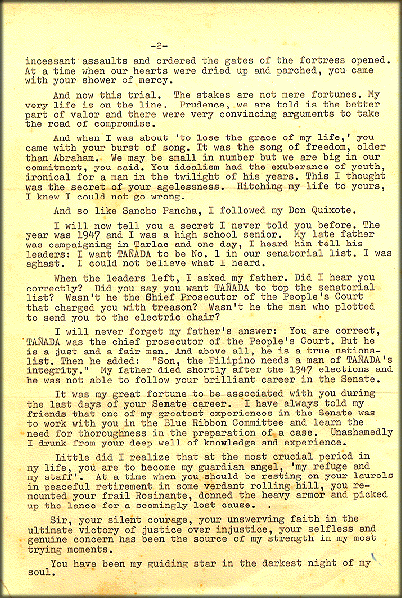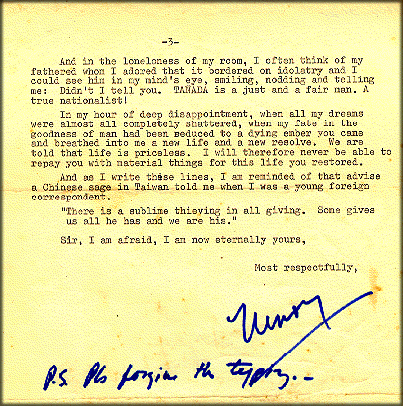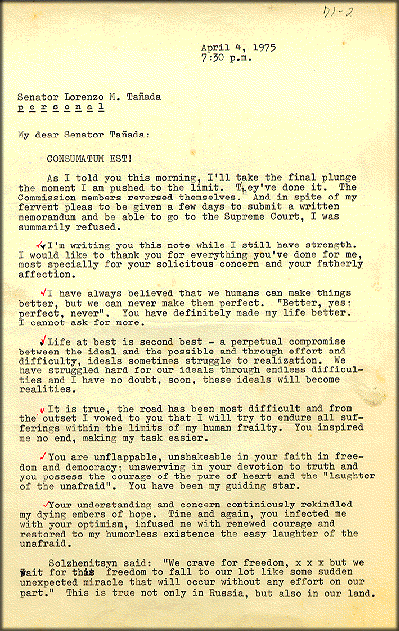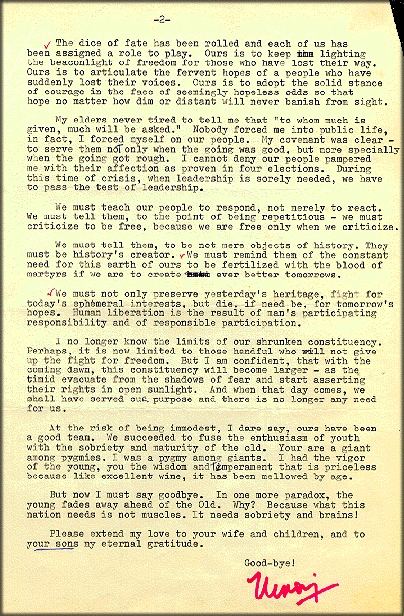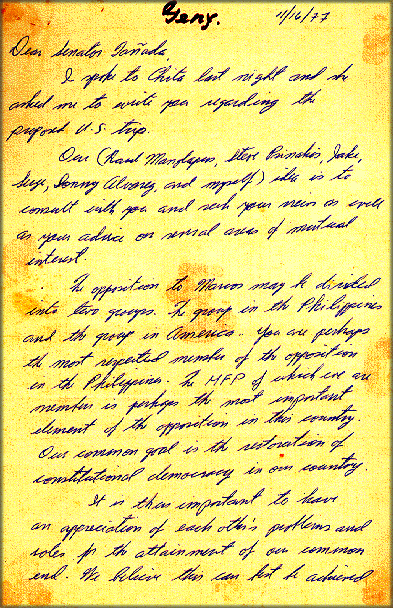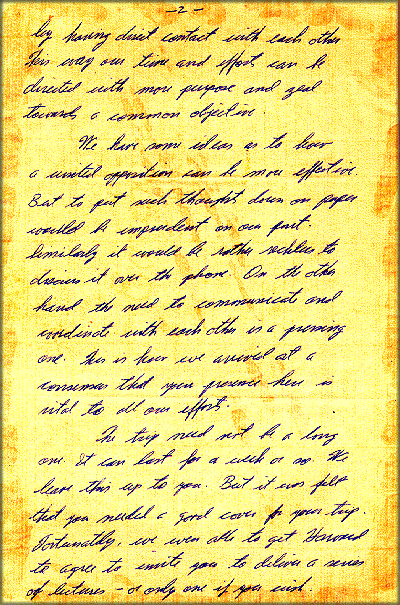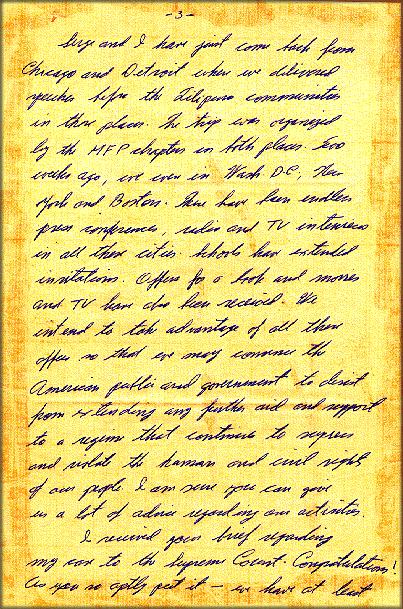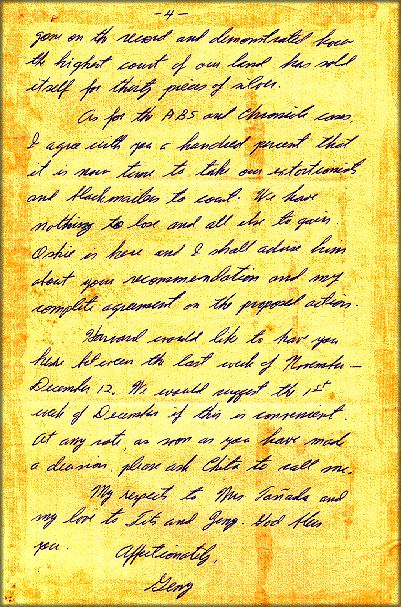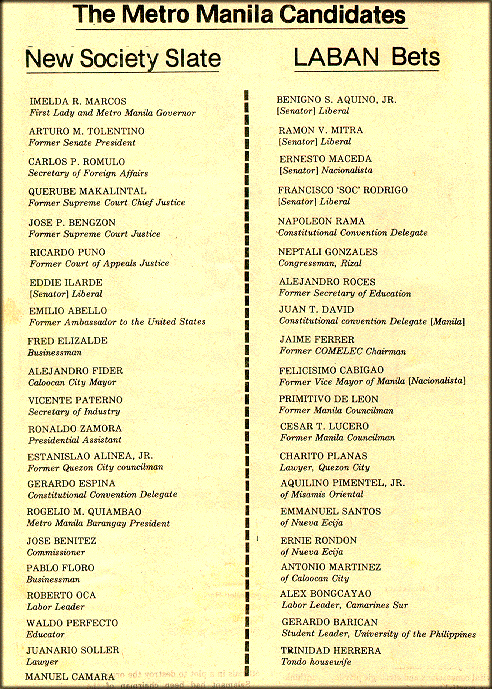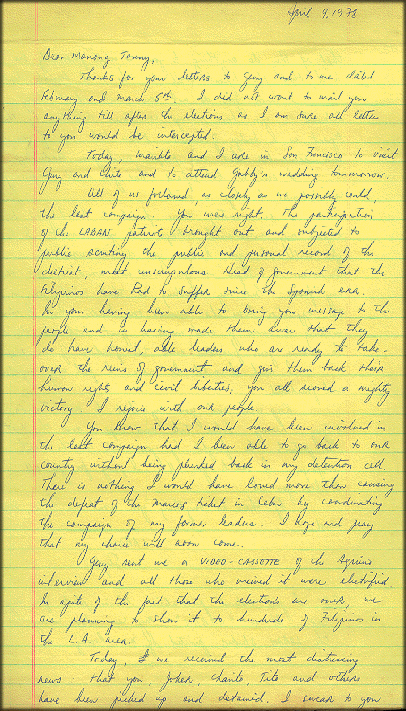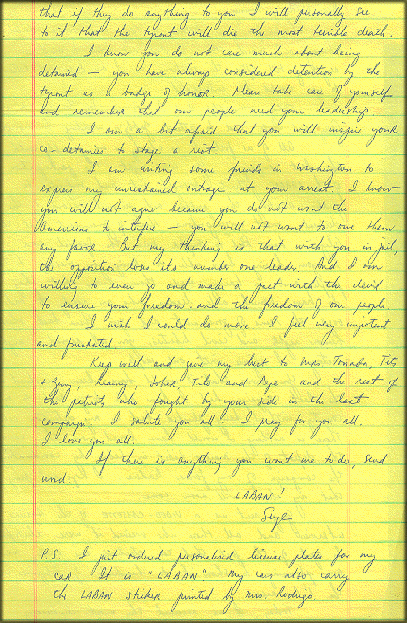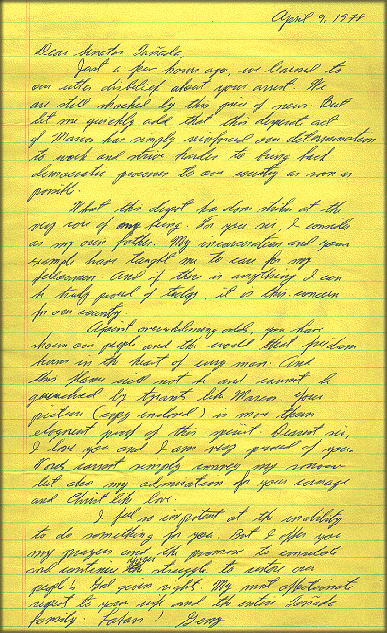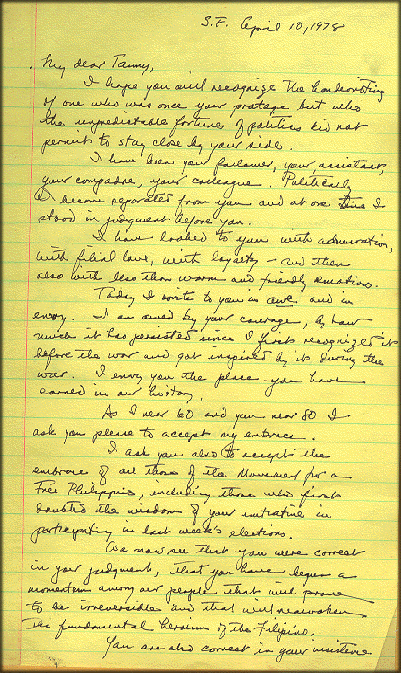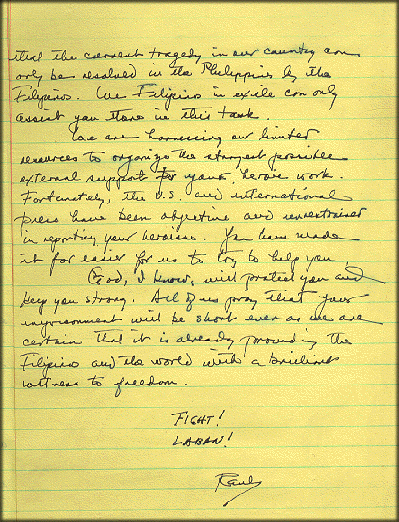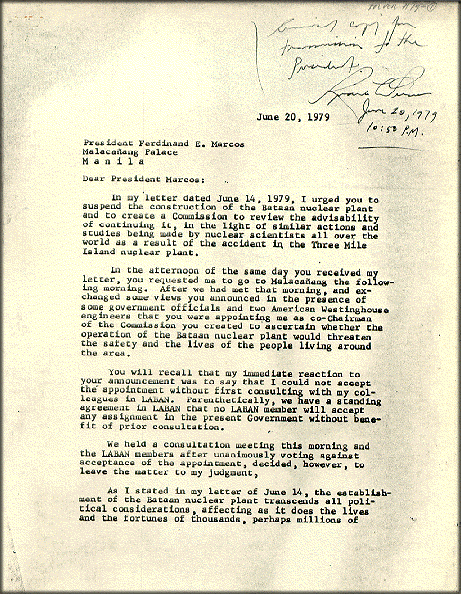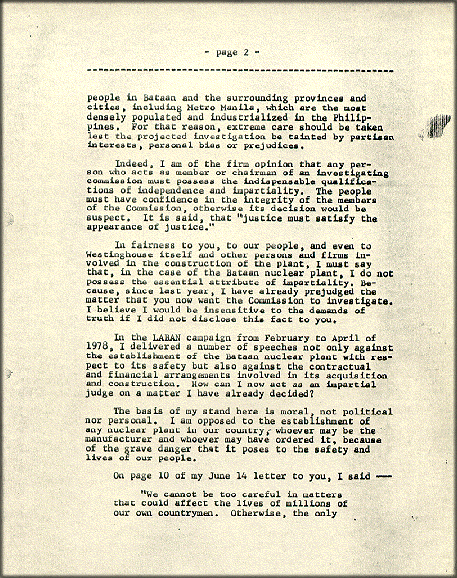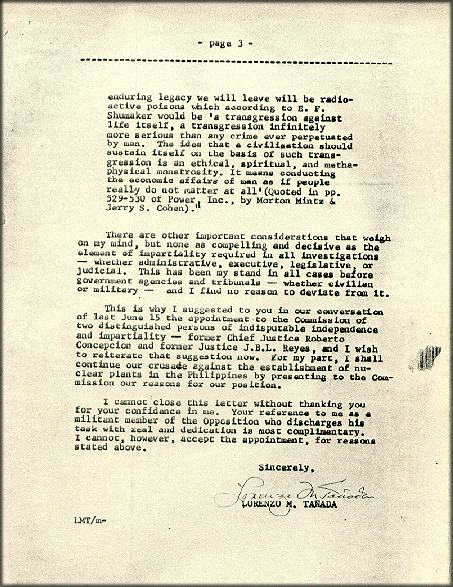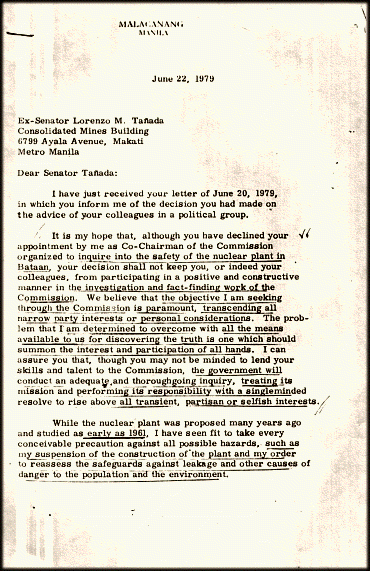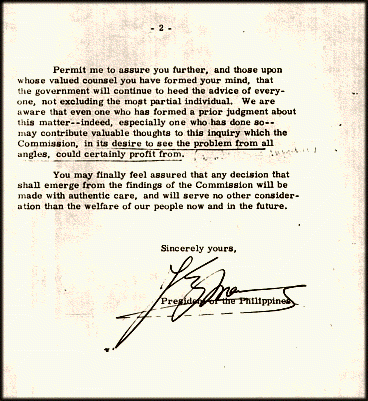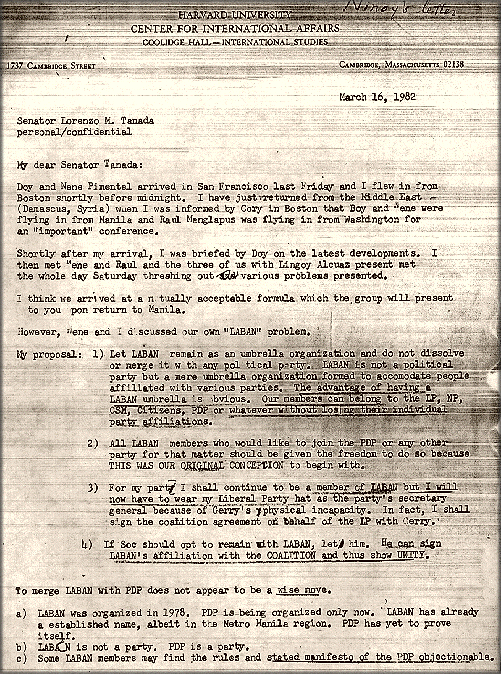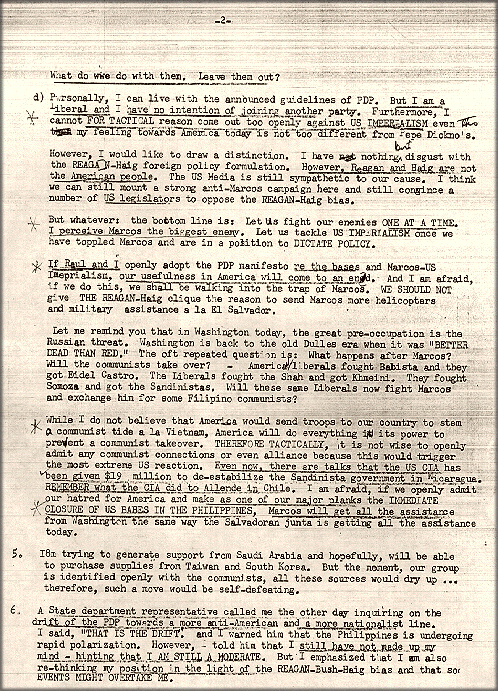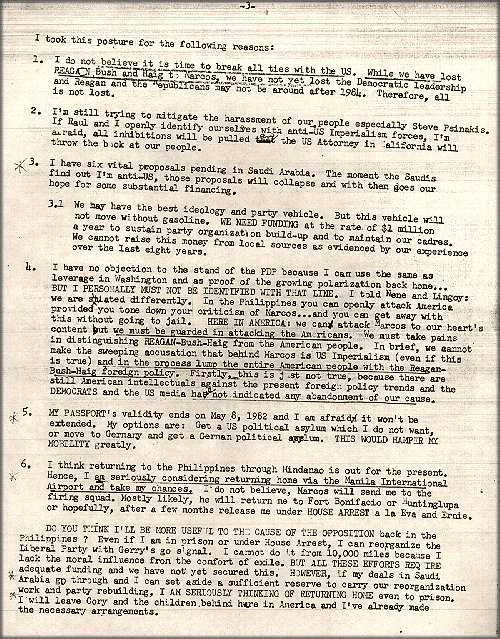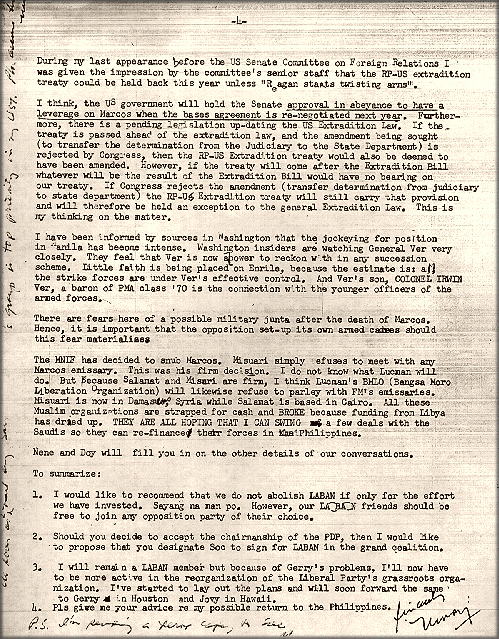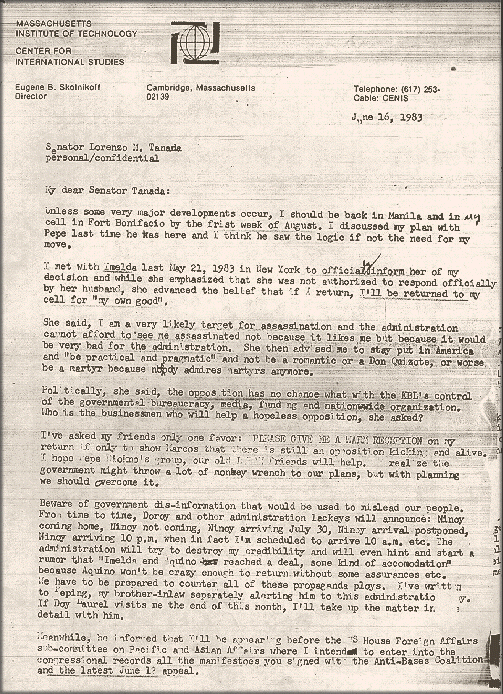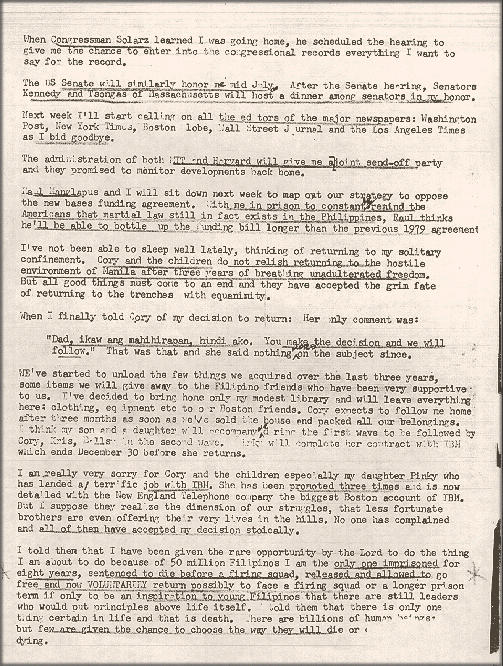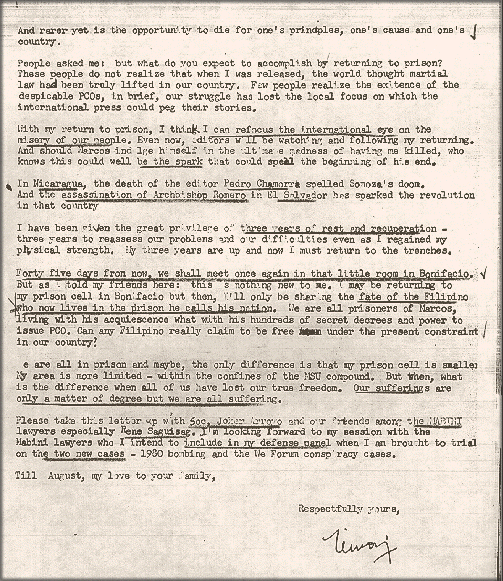National Leader of the Opposition
On 21 September 1972, President Ferdinand E. Marcos issued Presidential Decree No. 1081, otherwise known as Martial Law.
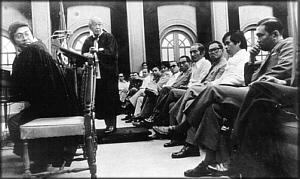
Tañada at the Supreme Court debating the legality of the declaration of Martial Law, assisted by his son Wigberto, seated left
Parasite souls content with obscure but fattening servitude will never understand why Tanny, discarding his high position in the party in power, should make war upon graft and corruption in the public service and persisted in the support of “uneconomic” causes, when he could very well have lapsed into opulent silence. They still wonder why he should’ve teamed up with the late Senator Recto in an endeavor to awaken the people’s nationalistic spirit, and why, being safely abroad when Martial Law was proclaimed, he should have risked his life and liberty by returning to the Philippines in order to defend up to now the innocent victims of oppression.
Jose B.L. Reyes in his tribute to Tañada during a testimonial dinner, 6 August 1983
Joker Arroyo on Tañada’s reaction upon learning of Martial Law imposition
The loudest and most enthusiastic reactions were elicited by any references to the dictatorship and Tañada’s now celebrated question: What is President Marcos today? The inference being that, if he is neither President under the 1935 Constitution nor President or Prime Minister under the 1973 Constitution, then he must be a usurper and dictator.
Liwayway Castellano, Asian Correspondent to the Philippine News, when Tañada went before the Supreme Court demanding that the nationwide referendum scheduled for 17 February 1975 be prohibited
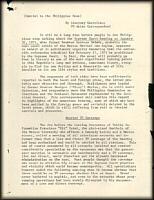
Philippine News Special
Philippine News Special
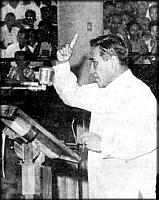
“Why have so many leaders ducked so many issues,” Tañada asks? “Why do people who willingly participated in the constitutional convention and signed its report now spend their time circulating underground manuscripts describing how the convention was bought off or strong-armed by the Marcos forces? Why didn’t they act when it might have done some good?”
Peter W. Stanley, San Francisco Journal, 22 March 1978
It was on August 27, 1973 that Ninoy Aquino was first brought to court to answer several charges against him: Illegal possession of firearms, murder, and violation of the anti-subversion act. He had then been languishing over a year, having been among those picked up by the military when Martial Law was declared in 1972.
Mr. & Ms., 30 September 1983
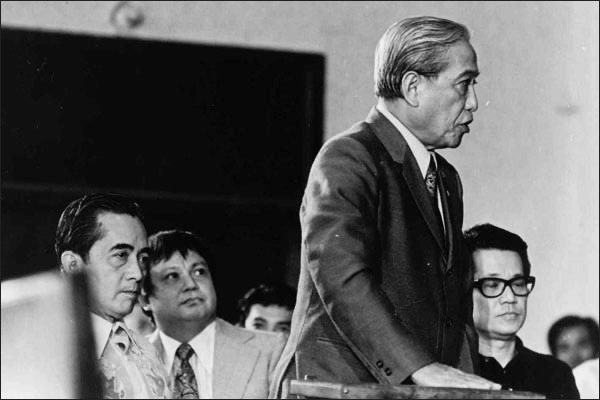

Tañada acts as counsel to Ninoy Aquino, with Ninoy’s wife Cory and Soc Rodrigo, 27 August 1973
Sir, your silent courage, your unswerving faith in the ultimate victory of justice over injustice, your selfless and genuine concern has been the source of my strength in my most trying moments.
Ninoy Aquino in a letter to Tañada, while detained at Fort Bonifacio, 29 August 1973
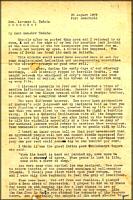
Letter from Aquino, 29 August 1973
Ninoy Aquino’s Letter to Tañada
I am writing you this note while I still have strength. I would like to thank you for everything you’ve done for me, most specially your solicitous concern and your fatherly affection. … You have definitely made my life better. I cannot ask for more.
Ninoy Aquino in a letter to Tañada while detained at Fort Bonifacio, 4 April 1975
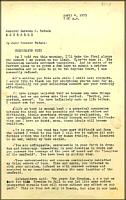
Letter from Aquino, 4 April 1975
Ninoy Aquino’s Letter to Tañada
You are perhaps the most respected member of the opposition in the Philippines.
Eugenio Lopez, Jr. in a letter to Tañada, while in exile in the United States, 16 November 1977
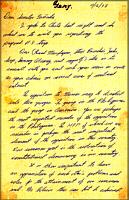
Letter From Lopez, 16 November 1977
Geny Lopez’s Letter to Tañada
Last week, Senator Tañada paid me his 146th visit since my arrest… “I will proceed to form the Slate,” he said, “if you agree to head it. I feel very strongly that this is a job that has to be done.” I did not even pause to reflect. I immediately accepted his offer as if hypnotized. We shook hands and the “Lakas Ng Bayan” was born.
Ninoy Aquino in a letter to his daughter Kris, 14 February 1978
Brig. Gen. Prospero Olivas, commander of the metropolitan police force, said those arrested would be charged with violating a presidential decree that prohibits political demonstrations. Among those detained was former Sen. Lorenzo Tañada, a 78-year old nationalist figure… The partial result tabulated… showed the People’s Force (Laban) being shut out of office. Its highest vote-getter, Benigno S. Aquino, had only 48,564 votes, about half of the lowest government candidate.
Minneapolis Tribune, 10 April 1978
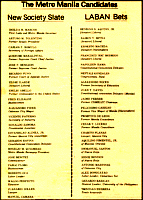
KBL vs. Laban
KBL vs. Laban
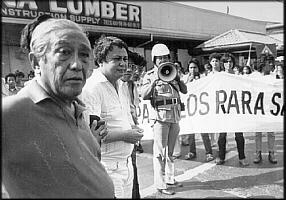
Tañada with Joker Arroyo during the protest demonstration
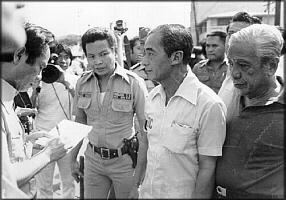
Tañada and Soc Rodrigo talk to the police force during the protest demonstration
Police armed with truncheons today broke up a procession staged to protest alleged massive fraud in Friday’s elections and arrested six opposition leaders and more than 500 of their followers. Among the 561 persons arrested two days after the government scored 21-0 sweep in the crucial political battle in Metro Manila for members of the Interim National Assembly were former Senators Lorenzo Tañada and Francisco Rodrigo. … Mr. Tañada, a Harvard-educated lawyer who served 24 years in the now disbanded Senate, is campaign manager of the opposition People Power (Laban) party… Teofisto Guingona, Ernesto Rondon and Aquilino Pimentel were also arrested. The sixth opposition leader jailed was Joker Arroyo.
Hong Kong Standard, 10 April 1978
“This is a funeral march commemorating the death of democracy in the Philippines,” said Lorenzo M. Tañada, who was campaign manager for the People’s Power (Laban) Party.
Chicago Tribune, 10 April 1978
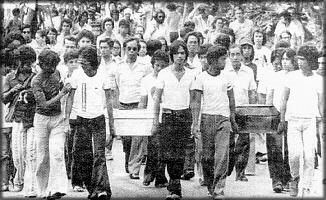
Demonstrators march carrying coffins allegedly containing the “remains of freedom and democracy”
So ended Marcos’ brief invitation to dissent. He had given his opponents free rein during the 45-day campaign for the first time since he imposed Martial Law in 1972. He even let his staunch rival, former Sen. Benigno Aquino, contest a seat from prison, where he awaited execution on a controversial murder conviction. “All we wanted to do was peacefully demonstrate our displeasure and disgust with the elections,” Tañada told me shortly before he was shown to his cell, “You see the result.”
Barry Came, Newsweek, 24 April 1978
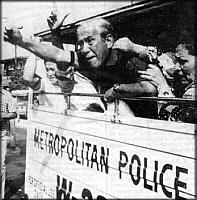
Tañada in this immortal shot shouting “Laban” upon his arrest on 9 April 1978. This picture was published in all the leading newspapers worldwide.
It was a proud day for Ka Tanny when he was arrested on April 9, 1978 during the protest march against the sham polls. He was happy he was finally arrested for he considered it a badge of honor to be a political prisoner. One famous picture of his arrest represents one lasting, defining memory of him: he thrust his fist outside the military van and shouted “Laban!” three times. He was detained for a week in Bicutan and didn’t want to be released until his co-detainees convinced him to leave because he could do more outside prison than inside.
Congressman Bobby Tañada, Tañada’s son, in a speech delivered on the 100th birth anniversary of Tañada, 10 August 1998
I know you do not care much about being detained—you have always considered detention by a tyrant as a badge of honor. Please take care of yourself and remember that our people need your leadership.
Sergio Osmeña, Jr. in a letter to Tañada, while in exile in the United States, 9 April 1978
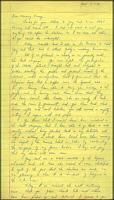
Letter From Osmeña, 9 April 1978
Sergio Osmeña’s Letter to Tañada, 9 April 1978
Against overwhelming odds, you have shown our people and the world that freedom burns in the heart of every man. And this flame will not be and cannot be quenched by tyrants like Marcos.
Letter From Lopez, 9 April 1978
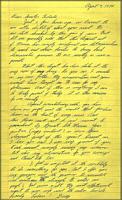
Letter From Lopez, 9 April 1978
Eugenio Lopez, Jr’s Letter to Tañada, 9 April 1978
I am awed by your courage, by how much it has persisted since I first recognized it before the war and got inspired by it during the war. I envy you for the place you have carved in our history.
Raul Manglapus in a letter to Tañada, while in exile in the United States, 10 April 1978
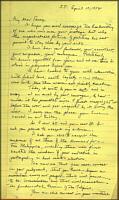
Letter From Manglapus, 10 April 1978
Raul Manglapus’ Letter to Tañada
I am writing you this letter fully conscious of the risk of being misunderstood even by my friends. But I believe, the time has come when all of us must subordinate our personal pride and interests to the common weal.
Ninoy Aquino in a letter to President Ferdinand Marcos, while in detention at Fort Bonifacio, 20 April 1978
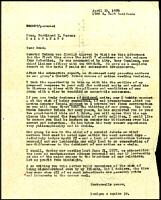
Letter to Marcos from Aquino, 20 April 1978
Senator Tañada was finally allowed to visit me this afternoon for the first time since the April 7 elections and his release from detention… If you are truly desirous of national unity, may I humbly suggest—at the risk of being gratuitous, if not presumptuous, —that you invite Senator Tañada soonest to a private but frank conversation so you will know first hand the thinking of our group. You have known Senator Tañada for many years, he has supported you in your two presidential bids and I think, you will agree that his age places him beyond the temptations of petty politics. I would like to assure you that he harbors no rancor nor bitterness over his arrest and detention. He has taken his very recent experience very philosophically and in stride.
Ninoy Aquino in a letter to President Ferdinand Marcos, while in detention at Fort Bonifacio, 20 April 1978.
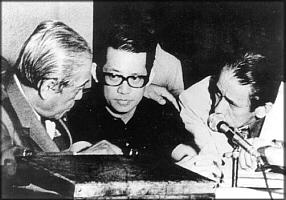
Tañada with Ninoy Aquino and Dakila Castro
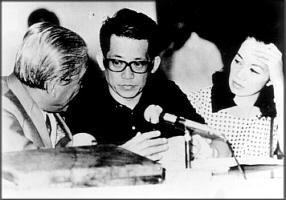
Tañada with Ninoy and Cory Aquino
Philippine opposition leader Lorenzo Tañada accused President Ferdinand Marcos last night of creating a dictatorial dynasty, and called on the people to join him in a non-violent crusade for freedom.
Mr. Tañada sounded the challenge before 300 prominent figures who came to dinner at Club Filipino for his 80th birthday. Organizers of the dinner had scheduled former Sen. Benigno Aquino as one of the speakers, hoping that he would be freed in time to attend. He was not, and his testimonial to his lawyer colleague was read by his wife, Corazon Aquino. Mr. Tañada has been working in recent months to obtain Mr. Aquino’s release under Mr. Marcos’ new conciliation policy. Mr. Aquino, the opposition party spokesman and longtime rival of Mr. Marcos, has been detained on various charges for almost six years.
“I believe we are daydreaming if we think those who now run government would voluntarily give up their martial powers and privileges,” Mr. Tañada said. He proposed a crusade of non-violence, contending that it would be “sheer madness to even think of force of arms against a regime which yearly receives millions of dollars in aid, military and economic, from the U.S.”
International Herald Tribune, 12 August 1978
We publicly honor Tanny by naming after him this Chair because he is a big part of our country’s history from the time of the Japanese occupation up to now. He has stood for integrity and principle against duplicity and opportunism. He has upheld the Rule of Law and maintained that no one be above the law. He has been the nemesis of graft and corruption in government. He held great power in the Senate but used it well and never ever learned how to abuse it nor to “play the game”.
Claudio Teehankee during the establishment of the Lorenzo M. Tañada Distinguished Chair of Philippine History at the De La Salle University, 3 April 1979
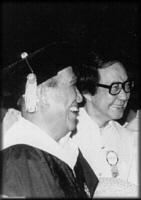
Tañada with Teehankee
From time to time, the group glanced warily across the plaza at four cream-colored squad cars, a large blue prisoners’ van and a dozen strategically scattered policemen. But they continued handing out their petitions. “Benigno Aquino has been in jail for six years and seven months,” Tañada told the churchgoers. “We feel his release is warranted by consideration of humanity and fairness not only to him but also to his long-suffering family”.
Newsweek, 23 April 1979
The basis of my stand here is moral, not political nor personal. I am opposed to the establishment of any nuclear plant in our country; whoever may be the manufacturer and whoever may have ordered it, because of the grave danger that it poses to the safety and lives of our people.
Tañada in a letter to President Ferdinand Marcos, expressing his objection to the establishment of the Bataan Nuclear Plant, 20 June 1979
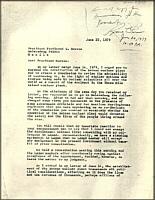
Letter to Marcos, 20 Jun 1979
Tañada’s Letter to Ferdinand Marcos, 20 June 1979
While the nuclear plant was proposed many years ago and studied as early as 1961, I have seen fit to take every conceivable precaution against all possible hazards, such as my suspension of the construction of the plant and my order to reassess the safeguards against leakages and other causes of danger to the population and the environment.
President Marcos in a letter to Tañada, acceding to Tañada’s request to stop the construction of the Bataan Nuclear Plant, 22 June 1979
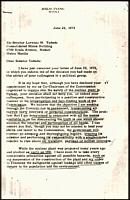
Letter from Marcos, 22 Jun 1979
Ferdinand Marcos’ Letter to Tañada, 22 June 1979
Former Senator Lorenzo M. Tañada asked Filipinos yesterday to reject the Marcos administration’s bid for legitimacy “by boycotting the June 16 presidential elections and by resisting all forms of harassment and intimidation to force them to go to the polls”. In calling for a boycott, Tañada said that “the elections are futile under Mr. Marcos—not only because of the overwhelming built-in advantages he enjoys, but mainly because the votes are grossly and dishonestly counted”.
Ding Marcelo, Bulletin Today, 12 June 1981

The 1973 Constitution is illegal. It was approved by the Convention under duress. It has never been ratified by the people. Therefore, the provision in that constitution making it an obligation for a citizen to vote is not an obligation at all. No illegal, illegitimate constitution can impose a duty upon a citizen.
Tañada in an interview with Jose Lacaba, Mr. & Ms., 16 June 1981
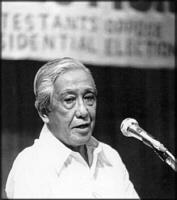
Mr. Tañada said: “Frankly, I do not know what Mr. Marcos will do.” But all indications point to Mr. Aquino’s eventual departure for the US… if he and Marcos agree on the conditions for his release. One sticky element is Mr. Marcos’ condition that Mr. Aquino refrain from criticizing him and his Martial Law regime abroad.
South China Morning Post, 5 January 1980
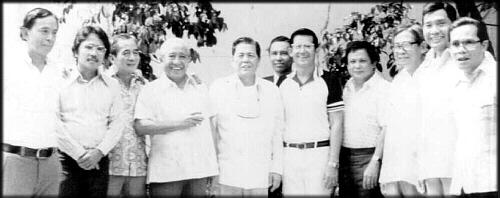
One very rare occasion when Ninoy was allowed to see his colleagues; (L-R) Nene Pimentel, Romy Capulong, Soc Rodrigo, Lorenzo Tañada, Jose Diokno, Raul Gonzales, Ninoy Aquino, Joker Arroyo, Sedfrey Ordoñez, Neptali Gonzales and Jovy Salonga
His concern extended to his friends, specially those who were at the receiving end of the drawn bayonets of Marcos’ fascist rule. After President Cory and Nena Diokno, he perhaps had the most number of visits to Ninoy and Ka Pepe at Fort Bonifacio. He even once smuggled out a letter of Ninoy which he hid in his shoe. As the grip of martial law tightened and lay waste our land and people, he made us, his children and grandchildren, memorize a poem that spoke of hope and redemption. He already knew the poem by heart because it helped ease the anguish he felt on his country’s enslavement. The title of the poem, “This, too, shall pass away” was to become a motto for our family in those long trying years.
Cong. Bobby Tañada, Tañada’s son, in a speech delivered during Tañada’s Centennial Birth Anniversary, 10 August 1998
By Paul Hamilton Hayne
Art thou in misery brother? Then I pray,
Be comforted: Thy grief shall pass away.
Thou art elated? Ah, be not too gay,
Temper thy joy: This, too, shall pass away.
Art thou in danger? Still let reason sway,
And cling to hope: This, too, shall pass away.
Tempted art thou? In all Thine anguish lay,
One truth to heart: This, too, shall pass away.
Do rays of loftier glory round thee play?
Kinglike art Thou? This, too, shall pass away.
Whatever Thou art, there ‘er Thy footsteps stray.
Heed these wise words: This, too, shall pass away.
I think returning to the Philippines through Mindanao is out for the present. Hence, I am seriously considering returning home via the Manila International Airport and take my chances. I do not believe Marcos will send me to a firing squad. Most likely, he will send me to Fort Bonifacio or Muntinglupa, or hopefully after a few months, release me under house arrest. I am seriously thinking of returning home even to prison.
Ninoy Aquino in a letter to Tañada, contemplating his return from the US to the Philippines, 16 March 1982

Letter From Aquino, 16 Mar 1982
Ninoy Aquino’s Letter to Tañada
His life work as Fiscal, Solicitor General, Senator and leader of the Bar, the distinguishing characteristic has been a consistent and steadfast adherence to the principles of truth, justice, integrity and the public welfare.
Not a single one of his enemies has been able to charge him with any inconsistency in that regard; they have tempted him with the perquisites of power or sought to make him bow to pressure, but have all signally failed to induce him to depart from the path of patriotism and rectitude. Unable to deny the truth and the force of his arguments, they resort to ignoring him, as if such studious disregard could place truth and reason on their side.
Justice Jose B.L. Reyes in his tribute to Tañada during a testimonial dinner, 6 August 1983
In many ways, we are thankful to Ka Tanny. He has been a strong staff to grasp and wield in our many battles for freedom and justice. He has served as an inspiration for steadfastness in the face of temporary defeat. He is a fount of wisdom, the puissance of his mind has illuminated the way through the tangle of issues that at times has confounded us. He has been a counsel restraint at critical times, and a cudgel for daring at the proper hour to do battle.
Political Detainees in the Philippines in their tribute to Tañada during a testimonial dinner, 6 August 1983
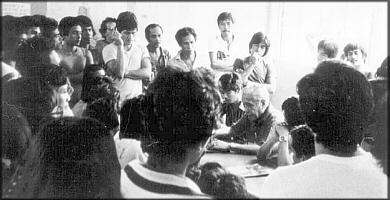
Tañada with political detainees
Tanny, all of us here and those who could not come but are here with us in spirit, had hoped to celebrate your birthday tonight with freedom. This was not to be. Yet we celebrate it still, for you are one of the last of our leaders who give us light in times of darkness, courage in days of despondency, hope in moments of despair. For so long as you continue to fight oppression, by alien powers or homegrown petty tyrants, so long will we know that the struggle of our people for justice, for liberty and for sovereignty has not been lost.
Jose W. Diokno, in a toast to Tañada on his 85th birthday, 10 August 1983
Nena Diokno, wife of Jose W. Diokno, on Tañada’s beliefs
We are most pleased to inform you that the Board of Judges of the Philippine Social Justice Award has unanimously chosen you as its 1983 Awardee. We cannot think of one who deserves the award more than you, who has spent most of your lifetime protecting and defending the rights of the underprivileged and those who have been denied social justice… This award comes as a fitting climax to your noble career.
Roberto Concepcion, Chairman of the Board of Judges for the Philippine Social Justice Award, 16 August 1983
I felt extremely happy because I thought the award and the high honor that goes with it could be considered the climax of my humble efforts to help our people during this period of their oppression, and a valid reason for my retirement… But the euphoria did not last because I soon heard a still voice within me telling me that retirement during this critical times would be a betrayal of our people and of the award itself.
Old as I am, I still nourish the hope that I may yet see the day when our country would be, as Rizal had envisioned—where there are no slaves nor oppressors, where each receives what is due him as a human person, and where only God’s justice which encompasses love and social justice, is supreme and prevails.
Tañada, at 85, as he received the Philippine Social Justice Award, Malaya, 29 September 1983
I met with Imelda last May 21, 1983 in New York to officially inform her of my decision… She said, I am a very likely subject for assassination and the administration cannot afford to see me assassinated, not because it likes me, but because it will be very bad for the administration. She then advised me to stay put in America and “be practical and pragmatic” and not a romantic or a Don Quixote, or worse be a martyr because nobody admires martyrs anymore.
Ninoy Aquino in a letter to Tañada, relating his meeting with then First Lady Imelda Marcos who warned Aquino of an assassination plot if he returned to the Philippines, 16 June 1983
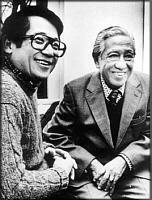
Tañada with Ninoy Aquino during a visit to the US
There are billions of human beings but few are given a chance to choose the way they will die… And rarer yet is the opportunity to die for one’s principles, one’s cause and one’s country.
Ninoy Aquino in a letter to Tañada, contemplating his return to the Philippines, 16 June 1983
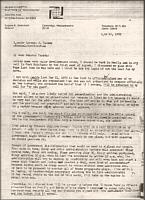
Letter from Aquino, 16 June 1983
Ninoy Aquino’s Letter to Tañada, 16 June 1983
Please give me a warm reception on my return if only to show Marcos that there is still an opposition kicking and alive. I realize the government might throw a lot of monkey wrench to our plans, but with planning, we should overcome it.
Ninoy Aquino in a letter to Tañada, contemplating his return to the Philippines, 16 June 1983
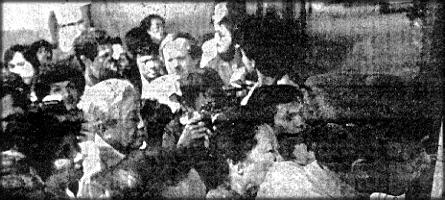
Tañada among welcomers at the Manila International Airport, 21 August 1983
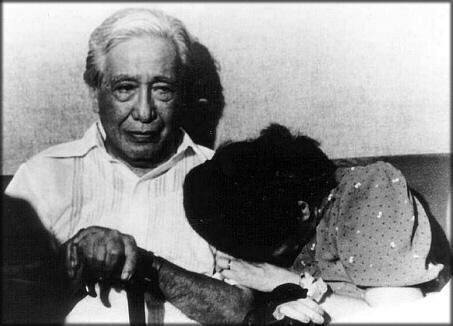
Tañada and Doña Aurora, mother of Ninoy Aquino, at the Manila International Airport, upon hearing of the shooting of Ninoy, 21 August 1983
He (Ninoy) delivered a speech in New York before the Asia Society in which he asked himself and fellow Filipinos the challenging question: “Is the Filipino worth suffering, or even dying for? Is he not a coward who would readily yield to any colonizer, be he foreign or home-grown? Is he prepared, or worse, ill-prepared for presidential or parliamentary democracy?”
Ninoy has given us his own answer to those questions. What about ours?
Tañada in a speech delivered to the Manila Jaycees, on the meaningful death of his friend Ninoy Aquino, 6 September 1983
In the aftermath of the Aquino assassination, Tañada served as a venerated leader of the Filipino people in nationalistic crusades to bring back democracy and independence to the Philippines. These include the crusades to oust the Marcos dictatorship through the parliament of the streets, the crusade to oppose the construction of the Bataan nuclear power plant, and the crusade to dismantle the US Military Bases.
